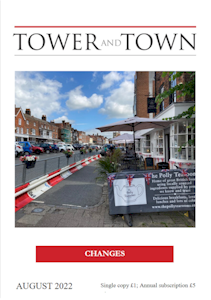

Tower and Town, August 2022 (view the full edition) (view the full edition)My Early Life (pt II)Part I of this memoir appeared in the June 2019 edition of Tower and Town. We pick up the story in the middle of WWII. At the top of Blowhorn Street were placed very heavy concrete bollards effectively blocking off Blowhorn Street from the Common. On the Rockley Road near to the Convalescent Home there was a First World War light tank, probably a Whippet tank, on which I used to play. One day this tank disappeared as scrap steel for the war effort. I loved looking at the military convoys and always waved at the soldiers passing through. No doubt with a young mother the soldiers liked waving back. One day, being frustrated about the convoys not crossing the Common, I moved a temporary signpost and so directed the convoy across the Common, unseen by my mother. Total chaos reigned, the convoy halted and a despatch rider on a motorbike returned not knowing what had happened to the convoy, and when he found his signpost turned, tore my mother off a strip. Round about the age of four, I experienced a rather sad time as my grandfather Pearce died followed shortly by my grandmother Newman. My grandfather Pearce had been very good to me, looking after me whilst my mother worked. My uncle Jack Pearce, who lived nearby in Laineys Close, had given me a large child's tricycle and granddad Pearce loved taking me out for rides. My grandmother Newman died suddenly aged 56 in the Railway Hospital in Swindon due to a strangulated hernia just a few weeks after my aunt Audrey (Benham) was married. My mother and I then went to Lydiard to look after her father as both he and Audrey were working fulltime in Swindon factories. Because of my age I had to attend school at Lydiard Millicent. After years of freedom it felt restricted and at each and every opportunity I would crawl under the laurel hedge and escape back to my grandfather's house with a teacher being sent to find me. Whilst staying at my grandparents' house, previously I was sat on their doorstep and heard and saw an aeroplane high in the sky circling around. I called my uncle Ron who had just joined the Airforce; he said it was a German plane and we should all take shelter under the kitchen table. Suddenly there was a loud whooshing noise and the roof tiles rattled. This was a bomb that landed about fifty yards away in what is now The Moors, but failed to explode as the ground was very boggy. The noise was probably due to the bomb falling at near supersonic speed. Maybe a year or so after, I was sitting on the doorstep of the same house, when a German bomber came over very low, painted all black. I clearly remember the white crosses and seeing the German crew. It was a Junkers 88 (I was pretty good at aircraft recognition even then), probably returning solo from a raid on Bristol, keeping very low, hedge hopping, to avoid fighter planes and anti-aircraft guns. Coming home to Marlborough, I was enrolled at St. Mary's Infant School in Herd St. At that time there was no cut through from Blowhorn St. to Herd St.; Burgesses' Nursery was blocking the way. So, we had to go via St.Martins, past Baden's grocery shop on the corner of St. Martins and Blowhorn Street. This little shop was operated by an old couple, the Badens, and seemed to stock all our daily needs. We were registered for rationing at the London Road Post Office, next to the Five Alls pub (now long gone), as my mother was a friend of the owner. This was where we purchased our staples, butter, margarine, cheese, sugar, etc but we always obtained meat products from Coopers in The Parade. We used to get our free milk ration at St. Mary's; this used to come in a large churn and was doled out with a ladle into battered enamel mugs. I remember it did not taste too good on hot summer days. Some teachers, particularly Miss Bryant, were very kindly persons, but the headmistress, Miss Thomas, was a real tartar. Opposite the school were the school gardens, a lovely lawn and herbaceous borders, but we only ever went there once in my two years at the school. The school did benefit from visits by US servicemen, who distributed sweets (candies) to the pupils, a rare luxury. Garth Pearce |